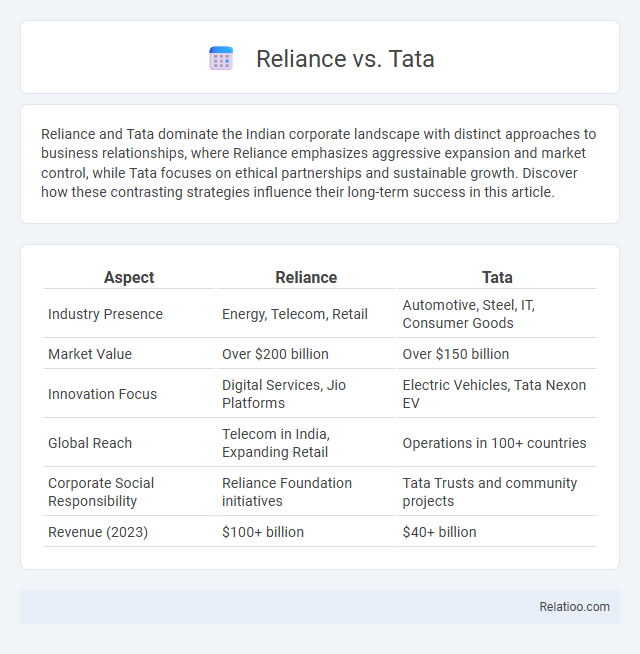Reliance and Tata dominate the Indian corporate landscape with distinct approaches to business relationships, where Reliance emphasizes aggressive expansion and market control, while Tata focuses on ethical partnerships and sustainable growth. Discover how these contrasting strategies influence their long-term success in this article.
Table of Comparison
| Aspect | Reliance | Tata |
|---|---|---|
| Industry Presence | Energy, Telecom, Retail | Automotive, Steel, IT, Consumer Goods |
| Market Value | Over $200 billion | Over $150 billion |
| Innovation Focus | Digital Services, Jio Platforms | Electric Vehicles, Tata Nexon EV |
| Global Reach | Telecom in India, Expanding Retail | Operations in 100+ countries |
| Corporate Social Responsibility | Reliance Foundation initiatives | Tata Trusts and community projects |
| Revenue (2023) | $100+ billion | $40+ billion |
Overview of Reliance and Tata
Reliance Industries Limited is a diversified conglomerate led by Mukesh Ambani, specializing in petrochemicals, refining, telecommunications through Jio, and retail sectors, making it one of India's largest private companies by revenue. Tata Group, founded by Jamsetji Tata, operates across multiple industries including steel, automotive, IT services, hospitality, and consumer goods, known for its global footprint and strong brand value. Your choice between Reliance and Tata depends on the sector focus and strategic business interests, as both represent pillars of India's industrial and economic growth.
Historical Background and Growth
Reliance Industries, founded by Dhirubhai Ambani in 1966, rapidly grew from a textile manufacturer to a diversified conglomerate dominating petrochemicals, telecommunications, and retail sectors. Tata Group, established in 1868 by Jamsetji Tata, evolved into one of India's largest and oldest conglomerates with significant footprints in steel, automotive, IT services, and hospitality. Both Reliance and Tata have demonstrated exponential growth, with Reliance leveraging aggressive market expansion and technology-driven ventures, while Tata capitalized on its legacy of innovation and global acquisitions.
Core Business Sectors
Reliance Industries dominates core business sectors such as petrochemicals, refining, and telecommunications, leveraging its massive refining capacity and Jio's broadband services. Tata Group, with a diverse portfolio, excels in automotive manufacturing, steel production through Tata Steel, and IT services via Tata Consultancy Services (TCS). Your strategic decisions may depend on understanding how Reliance's energy focus contrasts with Tata's industrial and technology-driven sectors.
Leadership and Management Styles
Reliance demonstrates a visionary leadership style with Mukesh Ambani emphasizing innovation and long-term growth, while Tata's leadership under Natarajan Chandrasekaran reflects a collaborative and ethical management approach focused on sustainable development. Reliance's hierarchical organizational structure contrasts with Tata's decentralized model that empowers individual business units, enabling agility and responsiveness. Your choice between these giants depends on valuing either Reliance's aggressive expansion strategies or Tata's commitment to corporate social responsibility and inclusive growth.
Financial Performance Comparison
Reliance Industries reported a net profit of Rs53,739 crore in FY2023, driven by strong performance in refining and telecommunications. Tata Group's consolidated revenue reached Rs9.2 lakh crore with a net profit of Rs89,861 crore, reflecting robust growth across sectors including automotive, IT services, and steel. Reliance's market capitalization of over $200 billion surpasses Tata's $150 billion, highlighting Reliance's dominant market presence despite Tata's diverse industrial footprint.
Innovation and Technology Initiatives
Reliance leads in digital transformation with Jio's disruptive 4G technology and ambitious 5G rollout, revolutionizing connectivity across India. Tata Group excels in tech-driven sustainability through Tata Motors' electric vehicle advancements and Tata Consultancy Services' AI-powered solutions for global enterprises. Your strategic choice between these giants hinges on whether you prioritize Reliance's telecom innovation or Tata's diversified tech ecosystem for long-term growth.
Market Strategies and Expansion
Reliance leverages aggressive diversification and digital innovation to dominate sectors like telecommunications, retail, and petrochemicals, while Tata emphasizes global expansion and sustainability in industries such as steel, automotive, and IT services. Reliance's strategic partnerships and investment in emerging technologies fuel rapid market penetration, contrasting with Tata's focus on organic growth and legacy brand strength. Your choice depends on whether you prioritize swift market disruption or steady, sustainable global growth.
Social Responsibility and Sustainability
Reliance Industries, Tata Group, and Adani Group each demonstrate strong commitments to social responsibility and sustainability through diverse initiatives. Tata Group emphasizes community development, environmental conservation, and renewable energy investments, leveraging its extensive corporate social responsibility programs. Your choice between these conglomerates may depend on their distinct approaches, with Reliance focusing on large-scale waste management and clean energy, Tata prioritizing integrated social welfare, and Adani driving sustainable infrastructure and green energy innovations.
Key Challenges and Controversies
Reliance Industries faces significant regulatory scrutiny and environmental concerns, particularly regarding its telecom and petrochemical ventures, impacting its operational transparency and compliance. Tata Group, while known for ethical business practices, has dealt with internal leadership disputes and challenges in managing its diverse conglomerate portfolio, affecting corporate governance stability. Both giants confront intense market competition and pressures from evolving regulatory landscapes, necessitating agile strategic responses to sustain growth and investor confidence.
Future Prospects and Outlook
Reliance Industries continues to expand its footprint in digital services and renewable energy, leveraging Jio Platforms and investments in green hydrogen to drive long-term growth. Tata Group's diversified portfolio, spanning automotive, IT services, and steel, is positioned for sustained innovation and global market expansion, supported by Tata Motors' electric vehicle initiatives and Tata Consultancy Services' strong IT demand. Both conglomerates are investing heavily in sustainability and technology, but Reliance's aggressive push in digital ecosystems and energy transition offers a potentially higher growth trajectory in future markets.

Infographic: Reliance vs Tata
 relatioo.com
relatioo.com